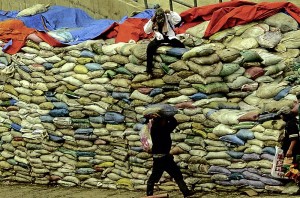Technology seen as garbage woe solution

BAGUIO’S first foray into solid waste technology is a machine that converts organic trash into powdered fertilizer (seen stacked in sacks here) using a patented Japanese microorganism. The city, however, has been unable to sell the fertilizers. EV ESPIRITU/INQUIRER NORTHERN LUZON
BAGUIO CITY—The summer capital, subject of a temporary environmental protection order (Tepo) for a 2011 trash slide, is exploring biotechnological solutions to its garbage woes.
That’s because its experts believe that developing an ecological landfill soon has become unlikely.
“Landfill development has taken up our time and resources for years and we still generate resistance from communities, and why not? Who wants a landfill in their backyard? So our real solution is in technology,” said Romeo Concio, the city’s general services officer and head of a solid waste management task force.
Concio clarified that the city government has not abandoned plans to build a landfill.
The Department of Environment and Natural Resources has acknowledged difficulties in securing community support for ecological landfills, and is now encouraging the use of new technologies, said Clarence Baguilat, DENR Cordillera director.
Abner Villanueva, DENR Cordillera spokesperson, said only 44 out of 1,491 towns and 143 cities are served by sanitary landfills. But 66 new sanitary landfills have received environmental compliance certificates and are now being built, he said.
“We encourage new technology,” he said. New technology, however, should first pass through the Department of Science and Technology, he added.
Concio said Baguio is studying the offer of two firms to set up waste-to-energy facilities. One firm, E-Next Philippines Inc., offered a machine that would turn wastes into coal.
This is not Baguio’s first venture into garbage technology. The city government operates two machines using Shimose microbes, which consume and convert organic wastes into powdered fertilizer.
The city, however, has not been able to profit from the fertilizer and is auditing the cost of operating the machines, Concio said.
Waste-to-energy facilities in areas like Nueva Ecija have been opposed by residents. In La Trinidad, Benguet province, the decision by Mayor Gregorio Abalos Jr. to operate a thermal plant called “Black Hole” led to complaints and a graft case against town officials in January. Vincent Cabreza, Inquirer Northern Luzon